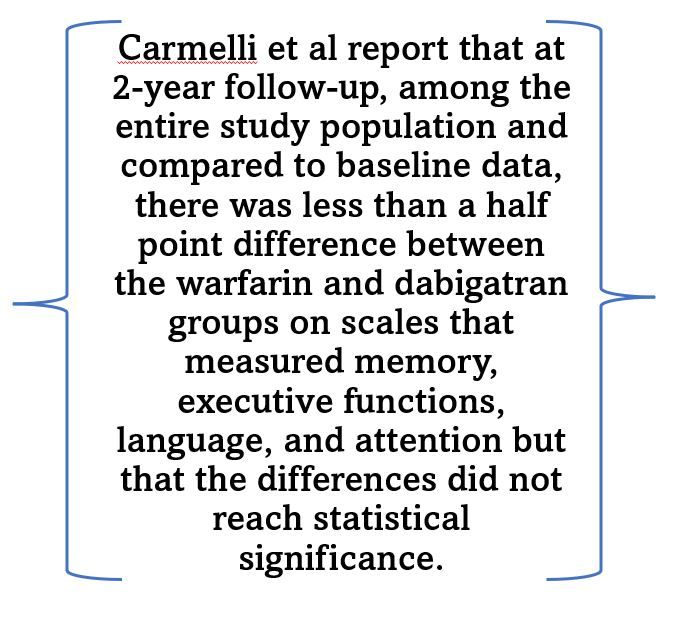- Clinical Technology
- Adult Immunization
- Hepatology
- Pediatric Immunization
- Screening
- Psychiatry
- Allergy
- Women's Health
- Cardiology
- Pediatrics
- Dermatology
- Endocrinology
- Pain Management
- Gastroenterology
- Infectious Disease
- Obesity Medicine
- Rheumatology
- Nephrology
- Neurology
- Pulmonology
Dabigatran and Warfarin Appear Similarly Protective Against Dementia
Patients taking either of the 2 anticoagulants showed no large differences on 4 cognitive test scores at 2 years, according to authors of the GIRAF trial.

Warfarin and dabigatran, when prescribed for and taken appropriately by patients with nonvalvular atrial fibrillation (AF) may protect equally against cognitive decline in older adults, according to results of the GIRAF trial presented during the American Heart Association (AHA) virtual Scientific Sessions.
GIRAF, (CoGnitive Impairment Related to Atrial Fibrillation) was designed to compare effects of the vitamin-k antagonist vs the factor Xa inhibitor on cognitive outcomes in adults with either AF or atrial flutter (AFl) aged ≥70 years.
Oral anticoagulant therapy has been associated in past research with lower risk of dementia although the underlying mechanism is unknown, according to an AHA statement.
“It’s possible that cognitive decline is related to the formation of small blood clots in the brain, which may be attacked by effective medications that prevent blood clots,” said lead study author Bruno Caramelli, MD, associate professor of medicine at the University of Sao Paulo in Brazil, in the statement. “Since dabigatran offers a more stable anticoagulation status, we investigated whether it may be more effective than warfarin for the prevention of cognitive decline in patients with atrial fibrillation.”
Caramelli and colleagues conducted parallel-group, randomized, controlled, open-label trial recruiting patients from 6 centers in Brazil. For inclusion patients were required to be aged ≥70 years, to have a confirmed diagnosis of AF or AFl, and a CHA2DS2-VASc Score >1. Excluded were patients with previous stroke, dementia, recent bleeding, active cancer, or left ventricular ejection fraction <35%.
Patients were evaluated at baseline and at 2 years for cognitive outcomes. The GIRAF assessment protocol, with all tests administered by neurologists blinded to group assignment, included the Montreal Cognitive Assessment (MoCA), Mini-Mental State Exam, a composite test battery including semantic and phonemic verbal fluency, Trail making A and B, Boston naming, clock-drawing test, and digit symbol substitution test. Patients also underwent brain MRI at baseline and at 2-year follow-up to identify potential cerebrovascular events.
The research team screened potential participants between November 2014 and March 2019 with a final group of 200 patients (124 men) meeting inclusion criteria out of an original 5523. The final group was randomized 1:1 to receive dabigatran (110 or 115 mg/day; n=99) or warfarin (once daily, controlled INR 2-3; n=101).

At baseline, patients randomized to warfarin had a mean age of 76 years, 59.1% were men, and median CHA2DS2-VASc score was 4. Among those randomized to dabigatran, mean age was 74, 61.4% were men, and CHA2DS2-VASc score was 4.
Caramelli et al report that at 2-year follow-up, among the entire study population and compared to baseline data, there was less than a half point difference between the warfarin and dabigatran groups on scales that measured memory, executive functions, language, and attention but that the differences did not reach statistical significance.
A statistically significant difference was observed for the MoCA score between groups, with a mean difference in change of -0.96 (95% CI, -1.8 to -0.13; P=.02) favoring warfarin.
No participants were diagnosed with dementia curing the follow-up, according to investigators.
“Cognitive aspects are important for patients with atrial fibrillation, and these results could help guide the decision about which oral anticoagulation medication should be prescribed,” said Caramelli. “Further studies are needed to explore new concepts on potential prevention of cognitive decline and the possible benefits of treatment for patients with atrial fibrillation and their families.”
Reference: Carmelli B, Yu PC, Cardozo FA, et al. Dabigatran versus warfarin on cognitive outcomes in nonvalvular atrial fibrillation: results of the GIRAF tiral. Presented at the American Heart Association Scientific Sessions 2021, presented virtually November 13-15, 2021.
